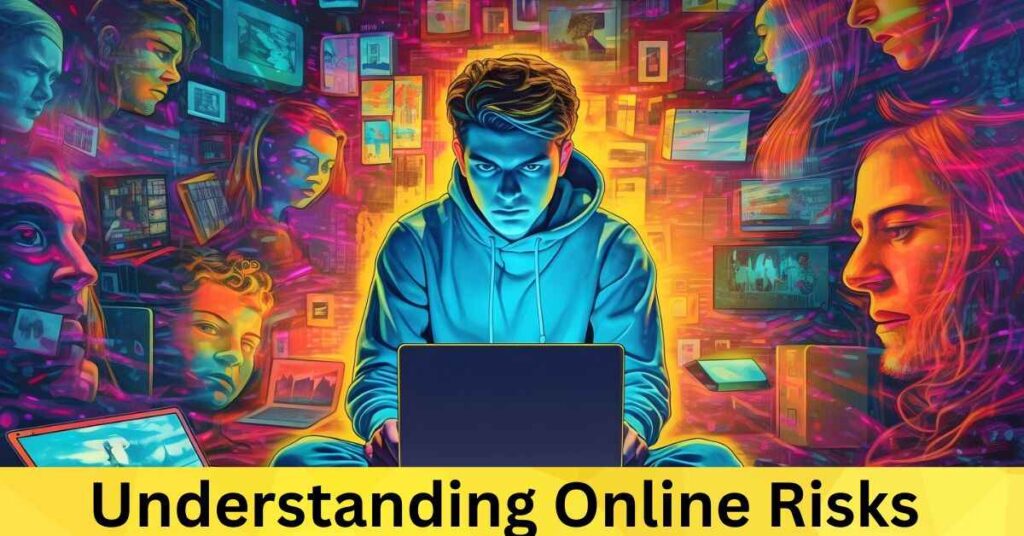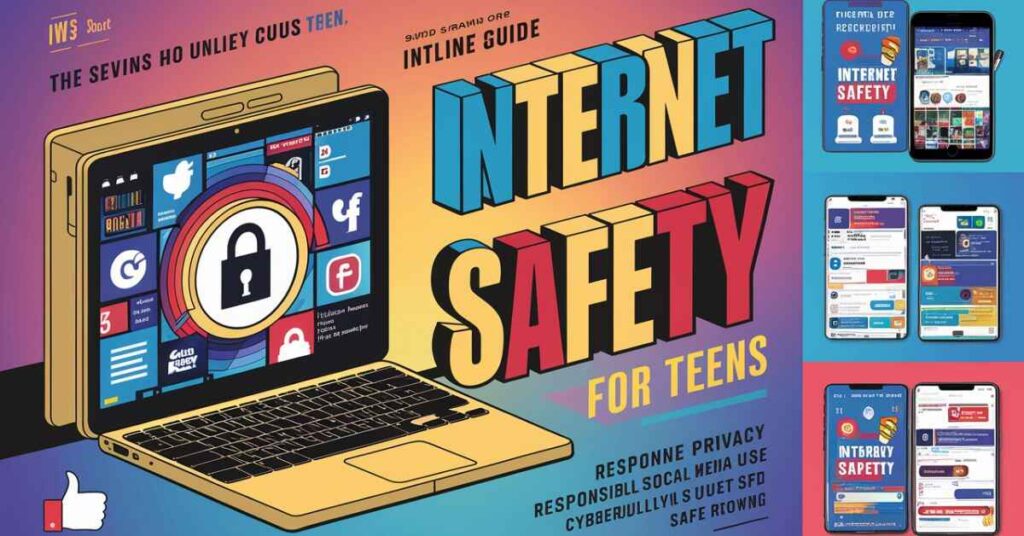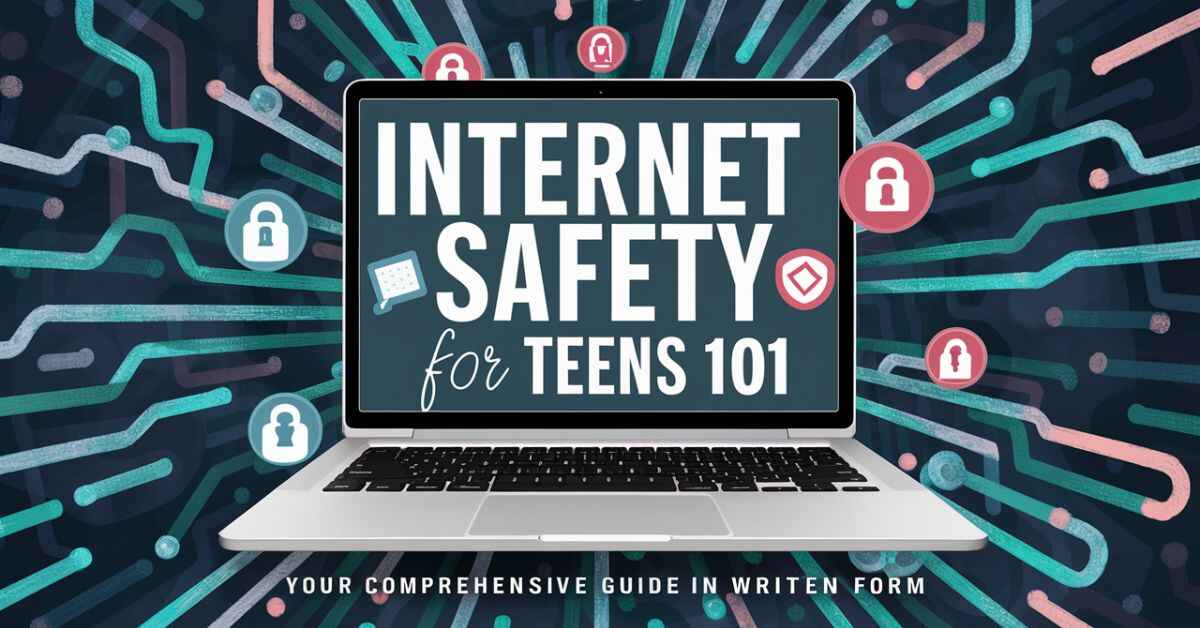In today’s hyper-connected world, teens are spending more time online than ever before. According to a recent Pew Research Center study, 95% of U.S. teens have access to a smartphone, and 45% say they’re online “almost constantly.”
With such pervasive internet use, teenagers must understand the importance of internet safety and develop smart online habits. This comprehensive guide will equip you with the knowledge and tools necessary to stay safe in the digital realm. Internet safety for Teens 101 – Your comprehensive guide.
Internet Safety for Teens: Reasons To Consider For Taking Measures
The Internet offers incredible opportunities for learning, socializing, and entertainment. However, it also presents unique risks that teens must navigate. Here’s why internet safety should be a top priority:
- Digital Footprint: Everything you post online contributes to your digital footprint, which can have long-lasting consequences. Future employers, college admissions officers, and even potential romantic partners may come across your online presence.
- Cyberbullying: The National Center for Education Statistics reports that 16% of students in grades 9-12 experienced cyberbullying in 2019. Online harassment can have severe impacts on mental health and well-being.
- Online Predators: While rare, the risk of encountering online predators is real. Predators often use grooming tactics to build trust with teens over time.
- Identity Theft: Teens are increasingly becoming targets for identity theft. The Federal Trade Commission reported over 23,000 cases of identity theft involving victims under 19 in 2020.
- Privacy Concerns: Many online platforms collect and sell user data. Understanding privacy settings and data collection practices is crucial for protecting personal information.
- Future Opportunities: Your online behavior can impact future opportunities. A CareerBuilder survey found that 70% of employers use social media to screen candidates during the hiring process. Internet safety for Teens 101 – Your comprehensive guide.
Understanding Online Risks

To stay safe online, it’s essential to understand the various risks you might encounter:
Social Media Pitfalls
Social media platforms can be a double-edged sword. While they offer ways to connect with friends and express yourself, they also present risks such as:
- Oversharing personal information
- Encountering cyberbullying or harassment
- Developing a distorted view of reality due to curated content
- Falling victim to scams or phishing attempts
Phishing and Scams
Phishing attacks and online scams are becoming increasingly sophisticated. Teens should be aware of:
- Fake emails or messages asking for personal information
- Too-good-to-be-true offers or contests
- Requests for money or financial information
- Suspicious links or attachments
Malware and Computer Viruses
Malicious software can compromise your device and personal information. Common sources include:
- Downloading files from untrusted sources
- Clicking on suspicious links
- Using outdated software or operating systems
Online Gaming Risks
While online gaming can be a fun social activity, it also comes with potential risks:
- Exposure to inappropriate content or language
- In-game purchases and microtransactions
- Addiction and excessive screen time
- Cyberbullying within gaming communities
Fake News and Misinformation
The spread of misinformation online can have serious consequences. Teens should develop critical thinking skills to:
- Verify sources of information
- Fact-check before sharing content
- Recognize biased or sensationalized news
Internet Safety Tips For Teens
Now that we’ve covered the risks, let’s dive into practical tips for staying safe online:
- Create Strong, Unique Passwords: Use a combination of uppercase and lowercase letters, numbers, and symbols. Avoid using easily guessable information like birthdates or pet names.
- Enable Two-Factor Authentication: This adds an extra layer of security to your accounts by requiring a second form of verification.
- Adjust Privacy Settings: Regularly review and update privacy settings on social media platforms to control who can see your content.
- Think Before You Post: Consider the potential long-term consequences of anything you share online. Would you be comfortable with your parents, teachers, or future employers seeing it?
- Be Cautious with Personal Information: Avoid sharing sensitive details like your full name, address, phone number, or financial information online.
- Use Secure Networks: Be wary of using public Wi-Fi for sensitive activities like online banking or shopping.
- Keep Software Updated: Regularly update your devices’ operating systems and apps to protect against security vulnerabilities.
- Use Reputable Antivirus Software: Install and maintain up-to-date antivirus software on all your devices.
Managing Online Relationships
Navigating online relationships can be tricky. Keep these tips in mind:
- Set Clear Boundaries: Establish what you’re comfortable sharing and stick to those boundaries.
- Recognize Red Flags: Be wary of people who pressure you for personal information or try to isolate you from friends and family.
- Meet Safely: If you decide to meet an online friend in person, always do so in a public place and bring a trusted adult.
- Block and Report: Don’t hesitate to block and report users who make you uncomfortable or engage in inappropriate behavior.
Communicating With Parents Or Guardians
Open communication with parents or guardians is crucial for online safety. Here’s how to approach it:
- Share Your Online Experiences: Keep your parents informed about your online activities and any concerns you may have.
- Establish Family Internet Rules: Work together to create guidelines for internet use that everyone agrees on.
- Ask for Help: If you encounter something online that makes you uncomfortable, don’t hesitate to ask for help.
Resources And Tools For Online Safety For Teenagers

There are numerous resources available to help teens stay safe online:
- Common Sense Media: Offers age-based media reviews and digital literacy resources.
- NetSmartz: Provides interactive online safety education for kids and teens.
- Cyberbullying Research Center: Offers information and resources for dealing with cyberbullying.
- StopBullying.gov: Provides comprehensive information on preventing and responding to bullying.
- HTTPS Everywhere: A browser extension that encrypts your communications with many major websites.
Helpful Tools:
| Tool | Purpose |
|---|---|
| LastPass | Password manager for creating and storing strong passwords |
| DuckDuckGo | Privacy-focused search engine |
| ProtonVPN | Free VPN service for enhanced online privacy |
| Qustodio | Parental control software with various safety features |
Conclusion
Navigating the digital world safely requires awareness, caution, and ongoing education. By understanding the risks, implementing safety measures, and maintaining open communication with trusted adults, teens can enjoy the benefits of the Internet while minimizing potential dangers. Remember, internet safety for teens is an ongoing process – stay informed, stay alert, and don’t hesitate to seek help when needed. Internet safety for Teens 101 – Your comprehensive guide.
Most Frequently Asked Questions About Internet Safety For Teens
Q: Why is internet safety crucial for teenagers?
Internet safety is paramount for teens due to the long-lasting impact of digital footprints, vulnerability to online threats, and the importance of building good online habits early. The choices teens make online can affect their future opportunities, relationships, and overall well-being.
Q: What are the top five internet safety rules for teens?
- Protect personal information by being selective about what you share online.
- Think critically before posting or sharing content.
- Use strong, unique passwords for all accounts and enable two-factor authentication.
- Be cautious with online relationships and never meet online friends in person without proper safety measures.
- Maintain open communication with parents or trusted adults about online activities and concerns.
Q: How can teens protect their personal information online?
Teens can protect their personal information by:
- Using privacy settings effectively on social media platforms
- Being selective about the information they share online
- Reading and understanding the terms of service for apps and websites
- Learning to recognize phishing attempts and scams
- Using secure payment methods for online purchases
- Avoiding sharing sensitive information like Social Security numbers or financial details online
Q: What are the most common risks for teenagers on the internet?
The most common risks for teenagers online include:
- Cyberbullying and online harassment
- Exposure to inappropriate or harmful content
- Online predators and grooming attempts
- Privacy breaches and identity theft
- Phishing scams and financial fraud
- Social media addiction and excessive screen time
- Exposure to misinformation and fake news








